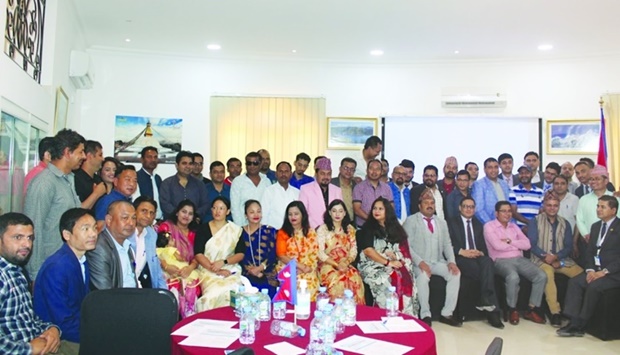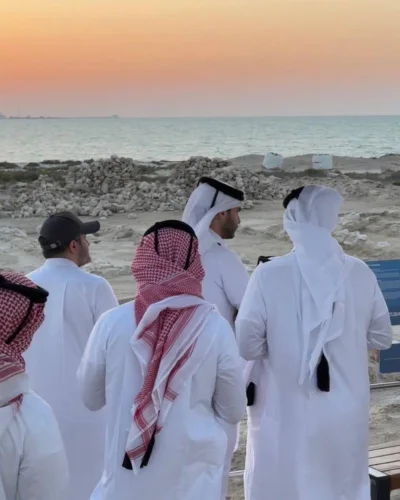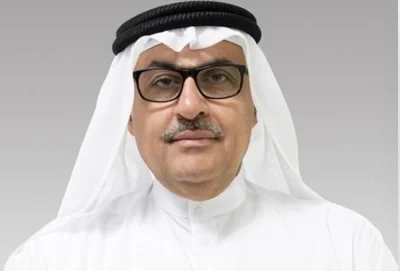The embassy of Nepal, in collaboration with Non-Resident Nepali Association (NRNA) Qatar, organised an awareness programme for members of the Nepali community in Qatar at the Embassy Hall recently.
The awareness programme was titled ‘Remittance and Financial Literacy’. It was attended by nearly 70 representatives of various Nepali community organisations in Qatar and was also broadcast live for other members of the community to benefit from the discussions.
The programme was intended to impart basic knowledge about the role of remittance and educate the attendees on the benefits of using official and formal banking channels for sending money back home.
Welcoming the participants, Mohamed Muktda Musalman, chair of NRNA Qatar, shed light on the objective of the programme. He encouraged each member of the Nepali community working abroad to contribute to the national economy by channelling remittances through official banking channels.
Ratna Raj Bajracharya, CEO of Global IME Bank Limited in Nepal, and Khilendra Paudel, CEO of IME Limited Nepal, delivered keynote addresses virtually from Nepal.
In his address, Bajracharya highlighted the importance of remittance in Nepal’s economy, especially in reinforcing foreign reserves. He pointed out that if remittances are transmitted informally or unofficially, this might promote an informal economy and illegal activities in the country.
Emphasising the productive utilisation of hard-earned remittances, Bajracharya noted that the Government of Nepal has introduced various incentives to promote remittances through formal banking channels.
Similarly, Paudel stressed that transmitting remittances through formal banking channels is the main way of getting registered in the formal economy of the country. This helps in attesting the source of income and there is no risk of losing money in between. Sending money unofficially or informally is illegal and there is a high risk of not being paid or getting cheated.
He highlighted that Nepal's government has arranged for 1% additional interest for people who remit their income through formal channels. Similarly, the government has also announced allocating an IPO quota for people working abroad.
Hemraj Subedi, representative of Global IME Bank Limited, and Dipendra Paudel, representative of IME Limited, made a presentation highlighting the need for
transmitting remittances through formal channels. They also touched upon the incentives provided by Nepal's government to facilitate the remittance flow.
The programme also included a question-and-answer session regarding the practical aspects of remittances, savings and transmitting remittances.
Charge d’Affaires of Nepal's embassy in Doha Lakshuman Khanal thanked the keynote speakers as well as the participants for their valuable contribution and active participation in the programme. He reiterated the messages delivered by the keynote speakers and stressed that transmitting remittances through formal banking channels was the right and legal method of sending money.
He said there are rumours that some people send money informally and unofficially due to their ignorance of the process or sometimes due to the promised higher exchange rates. He stressed this is risky for individuals and their families, as well as for society and the country.
Shedding light on some of the incentives the government has announced for encouraging remittances through formal channels, he requested the participants to spread the message of the programme to each and every member of the Nepali community.
The awareness programme was titled ‘Remittance and Financial Literacy’. It was attended by nearly 70 representatives of various Nepali community organisations in Qatar and was also broadcast live for other members of the community to benefit from the discussions.
The programme was intended to impart basic knowledge about the role of remittance and educate the attendees on the benefits of using official and formal banking channels for sending money back home.
Welcoming the participants, Mohamed Muktda Musalman, chair of NRNA Qatar, shed light on the objective of the programme. He encouraged each member of the Nepali community working abroad to contribute to the national economy by channelling remittances through official banking channels.
Ratna Raj Bajracharya, CEO of Global IME Bank Limited in Nepal, and Khilendra Paudel, CEO of IME Limited Nepal, delivered keynote addresses virtually from Nepal.
In his address, Bajracharya highlighted the importance of remittance in Nepal’s economy, especially in reinforcing foreign reserves. He pointed out that if remittances are transmitted informally or unofficially, this might promote an informal economy and illegal activities in the country.
Emphasising the productive utilisation of hard-earned remittances, Bajracharya noted that the Government of Nepal has introduced various incentives to promote remittances through formal banking channels.
Similarly, Paudel stressed that transmitting remittances through formal banking channels is the main way of getting registered in the formal economy of the country. This helps in attesting the source of income and there is no risk of losing money in between. Sending money unofficially or informally is illegal and there is a high risk of not being paid or getting cheated.
He highlighted that Nepal's government has arranged for 1% additional interest for people who remit their income through formal channels. Similarly, the government has also announced allocating an IPO quota for people working abroad.
Hemraj Subedi, representative of Global IME Bank Limited, and Dipendra Paudel, representative of IME Limited, made a presentation highlighting the need for
transmitting remittances through formal channels. They also touched upon the incentives provided by Nepal's government to facilitate the remittance flow.
The programme also included a question-and-answer session regarding the practical aspects of remittances, savings and transmitting remittances.
Charge d’Affaires of Nepal's embassy in Doha Lakshuman Khanal thanked the keynote speakers as well as the participants for their valuable contribution and active participation in the programme. He reiterated the messages delivered by the keynote speakers and stressed that transmitting remittances through formal banking channels was the right and legal method of sending money.
He said there are rumours that some people send money informally and unofficially due to their ignorance of the process or sometimes due to the promised higher exchange rates. He stressed this is risky for individuals and their families, as well as for society and the country.
Shedding light on some of the incentives the government has announced for encouraging remittances through formal channels, he requested the participants to spread the message of the programme to each and every member of the Nepali community.



